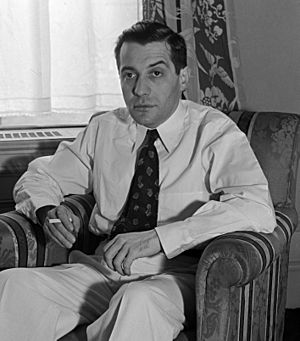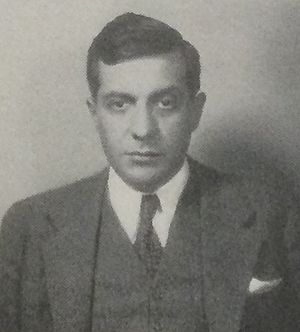Vito Marcantonio facts for kids
Quick facts for kids
Vito Marcantonio
|
|
|---|---|

Marcantonio in the 1930s
|
|
| Member of the U.S. House of Representatives from New York |
|
| In office January 3, 1935 – January 3, 1937 |
|
| Preceded by | James J. Lanzetta |
| Succeeded by | James J. Lanzetta |
| Constituency | 20th district |
| In office January 3, 1939 – January 3, 1951 |
|
| Preceded by | James J. Lanzetta |
| Succeeded by | James G. Donovan |
| Constituency | 20th district (1939–1945) 18th district (1945–1951) |
| Personal details | |
| Born |
Vito Anthony Marcantonio
December 10, 1902 New York, New York, U.S. |
| Died | August 9, 1954 (aged 51) New York, New York, U.S. |
| Nationality | American |
| Political party | American Labor (1937–1954) Republican (1935–1937) |
| Spouse |
Miriam A. Sanders
(m. 1925) |
| Alma mater | New York University School of Law |
Vito Anthony Marcantonio (December 10, 1902 – August 9, 1954) was an Italian-American lawyer and politician. He served East Harlem in the United States House of Representatives for seven terms.
For most of his career, he was part of the American Labor Party. He believed that the main political parties in the U.S. did not support the interests of working people. Before joining the Labor Party, he was a New Deal coalition member of the Republican Party. He supported Fiorello La Guardia, a well-known progressive leader. Marcantonio was a socialist who strongly supported working-class people, the poor, immigrants, labor unions, and African-American civil rights.
Marcantonio represented the East Harlem neighborhood in New York City. This area was home to many Italians, Jews, and Puerto Ricans. He could speak Spanish, Italian, and English.
Contents
Early Life and Education
Vito Marcantonio was born on December 10, 1902, in East Harlem, New York City. His father was born in America, and his mother was from Italy. Both their families came from Picerno, a town in Southern Italy.
He grew up in the Italian Harlem area, which was a poor neighborhood. He went to public schools in New York City. He was the only student from East Harlem in his class to graduate from De Witt Clinton High School. In 1925, he earned his law degree from the New York University School of Law.
Starting His Career in Politics
In 1924, Marcantonio helped with the election campaign for Fiorello La Guardia. LaGuardia was running for Congress. Marcantonio also worked to help U.S. Senator Robert M. La Follette become president.
After becoming a lawyer in 1925, Marcantonio started working at law firms. He worked with lawyers who often helped people and groups involved in political movements. He also became the secretary of the Tenants League. This group fought against high rents and evictions for people living in the city.
From 1926 to 1932, Marcantonio managed La Guardia's election campaigns. He also worked as an assistant United States attorney from 1930 to 1931.
Serving in Congress
Marcantonio was first elected to the United States House of Representatives in 1934 as a Republican. He served from 1935 to 1937 but lost his re-election bid in 1936. His district was in East Harlem, New York City. This area had many residents and immigrants from Italy and Puerto Rico.
Because he spoke Spanish and Italian, he was seen as a friend to the Puerto Rican and Italian-American communities. He was a strong supporter of workers, immigrants, and poor people.
In 1939, Marcantonio spoke out against the conviction of Pedro Albizu Campos. Campos was the president of the Puerto Rican Nationalist Party. Marcantonio also strongly supported African-American communities in Harlem. He fought for black civil rights many years before the main civil rights movement of the 1950s and 1960s.
Around 1937 or 1938, Marcantonio joined the American Labor Party (ALP). He was elected to the House again in 1938. He served six more terms, from 1939 to 1951. He was re-elected in 1940, 1942, 1944, 1946, and 1948. He was very popular in his district. He often won the nominations of both the Democratic and Republican parties. He also had the support of the ALP. This was an example of "electoral fusion," where one candidate gets nominated by multiple parties.
In 1948, Marcantonio strongly supported former Vice President Henry A. Wallace. Wallace ran for President with the Progressive Party. Marcantonio was re-elected that year. In 1949, he ran for Mayor of New York City on the ALP ticket but was defeated.
In 1950, Marcantonio lost his House seat to James G. Donovan. This happened after a very strong campaign against him. People were upset because he refused to vote for American involvement in the Korean War. Donovan had the support of the Democratic, Republican, and Liberal parties. A law passed in 1947, called the Wilson Pakula Act, also played a part in his defeat. This law stopped candidates from running in the primary elections of parties they were not officially part of. Many people thought this law was created to target Marcantonio.
Since he was the only representative from his party for most of his time in Congress, Marcantonio never led a committee. After his defeat in 1950, the American Labor Party soon broke apart.
Political Beliefs
Marcantonio's Roman Catholic faith influenced his political views. He always said he was Catholic. He believed that voting with his conscience was more important than party loyalty.
He was sympathetic to the Socialist and Communist parties. He also supported labor unions. The FBI looked into him in the 1940s and 1950s. This was because he was connected to people and groups linked to the Communist Party.
Fighting for Civil Rights
Marcantonio was a great champion of black civil rights in the 1930s and 1940s. He proposed bills to ban the poll tax. This tax was used in the Southern United States to stop poor voters from casting their ballots. He also wanted to make lynching a federal crime.
Views on Foreign Policy
In 1940, Marcantonio helped create the American Peace Mobilization (APM). This group wanted to keep the U.S. out of World War II. Marcantonio was a vice-chair of the APM. He appeared in a newsreel in 1940, speaking out against "imperialist war." This was a view shared by Joseph Stalin and his supporters in the Soviet Union.
In 1947, when the U.S. Congress voted to send money to fight communism in Turkey and Greece, Marcantonio was the only congressman who did not applaud. This showed his disagreement with the Truman Doctrine, which aimed to stop the spread of communism. In 1950, Marcantonio was against American involvement in the Korean War. He argued that North Korea had been attacked without reason by South Korea.
Freedom of Speech
In 1941, Marcantonio represented a high school coach named Dale Zysman. Zysman was also a board member of the New York City Teachers Union. Marcantonio argued for Zysman's right to speak freely.
Spanish in Puerto Rico's Schools
In 1946, Marcantonio introduced a law to make Spanish the main language for teaching in Puerto Rico's schools again. President Truman signed this bill. By 1948, schools could teach in Spanish, but English was still required as a second language.
Later Life and Death
After losing his mayoral and congressional elections, Marcantonio continued to work as a lawyer. He had used money from his law practice to help fund his political campaigns. He first practiced law in Washington, D.C., but soon returned to New York City.
In 1954, Marcantonio was running for Congress again. He was the candidate for a new political group called the Good Neighbor Party. He died on August 9, 1954, from a heart attack. This happened after he walked up subway stairs in Lower Manhattan. He was a devoted Catholic and received the last rites of the Church.
Legacy
Vito Marcantonio's collection of speeches, called I Vote My Conscience (1956), influenced many young activists. He was seen as a hero by some on the political left. This was because he defended workers rights, understood how to work in Congress, and connected with people in his district while also caring about global issues.
Works
Pamphlets written by Marcantonio include:
- Labor's Martyrs': Haymarket 1887 Sacco and Vanzetti 1927 (1941)
- Should America Go to War? (1941)
- Marcantonio Answers F.D.R.! (1941)
- Security with FDR (1944)
 | George Robert Carruthers |
 | Patricia Bath |
 | Jan Ernst Matzeliger |
 | Alexander Miles |


